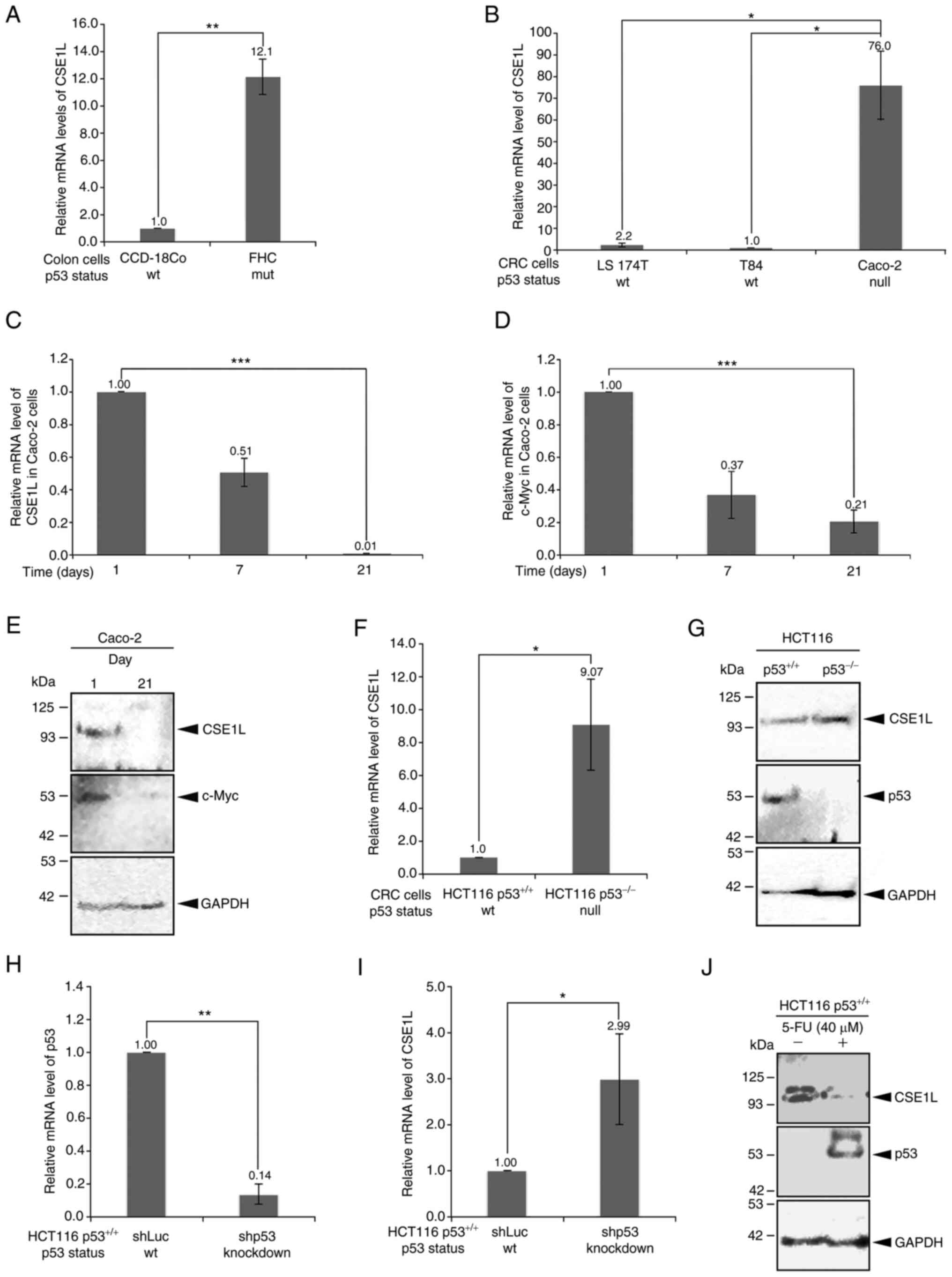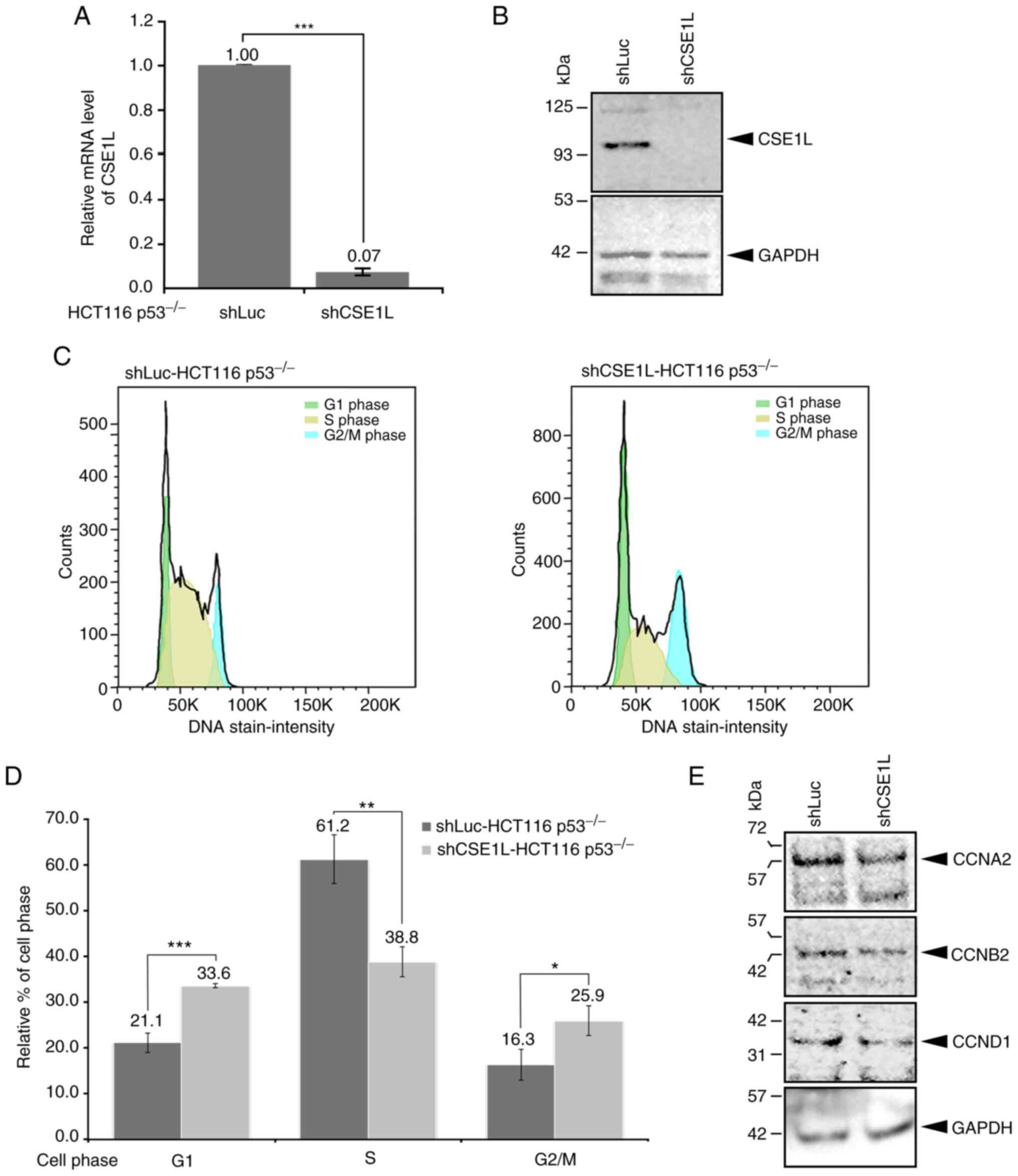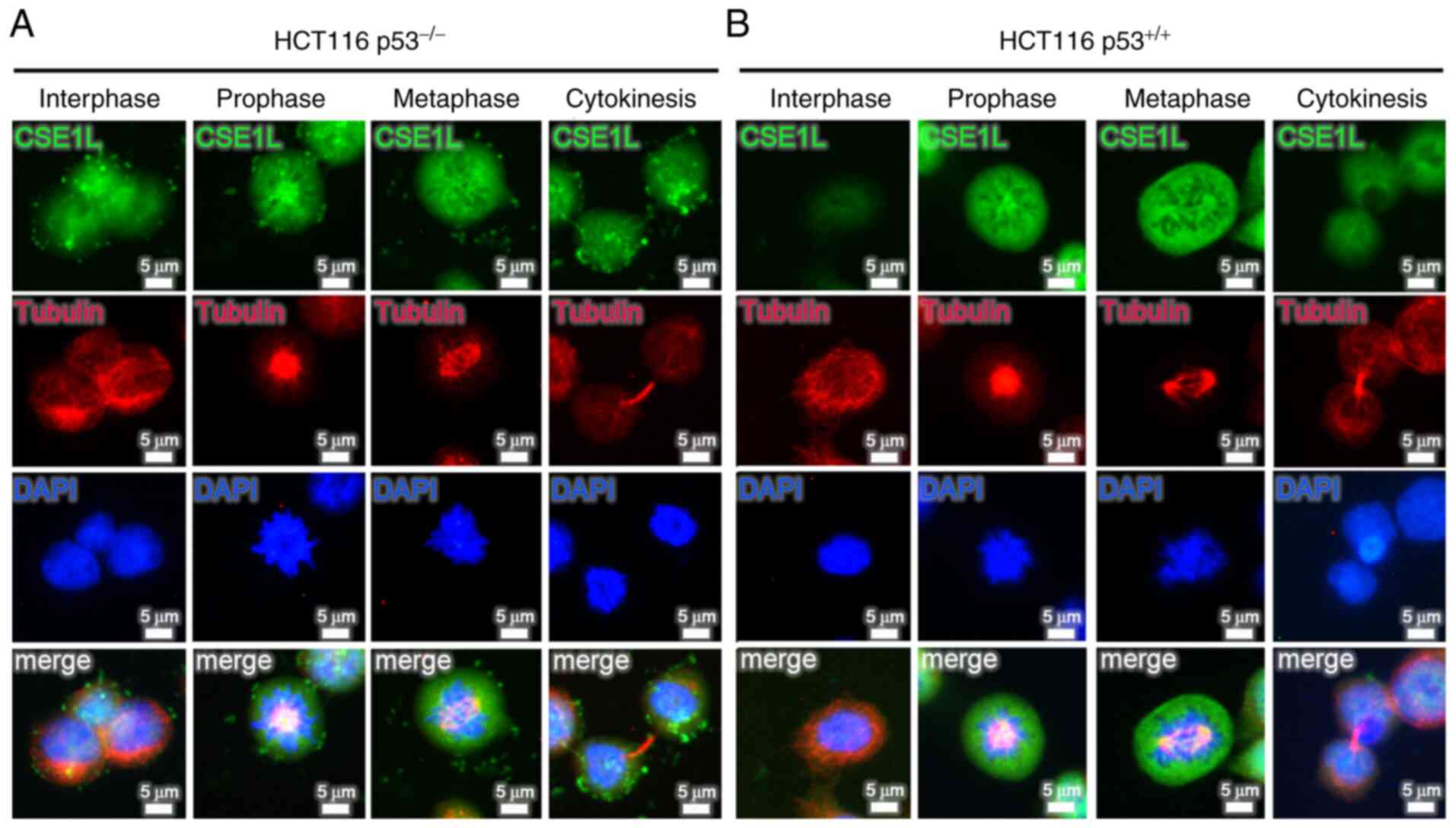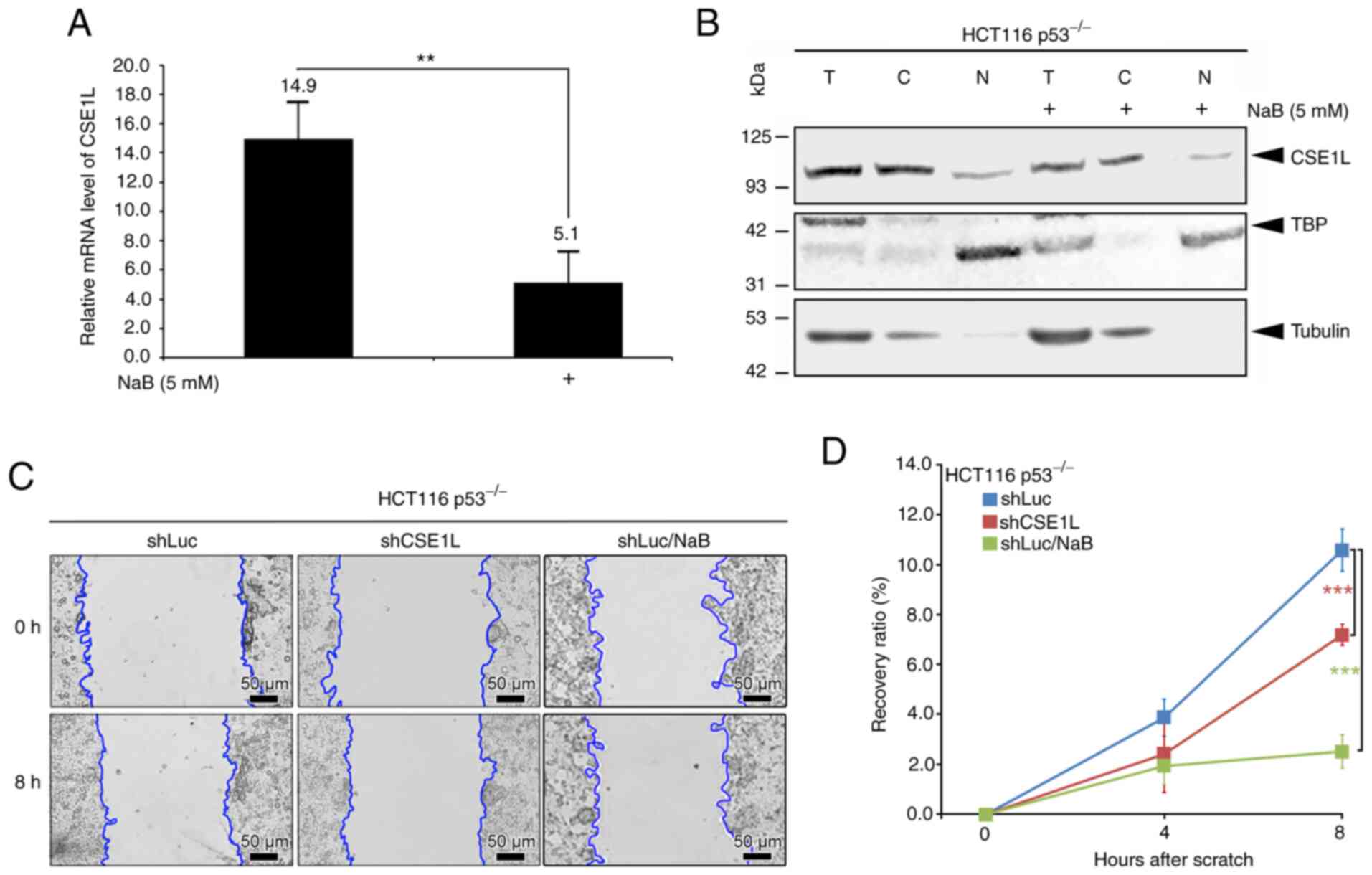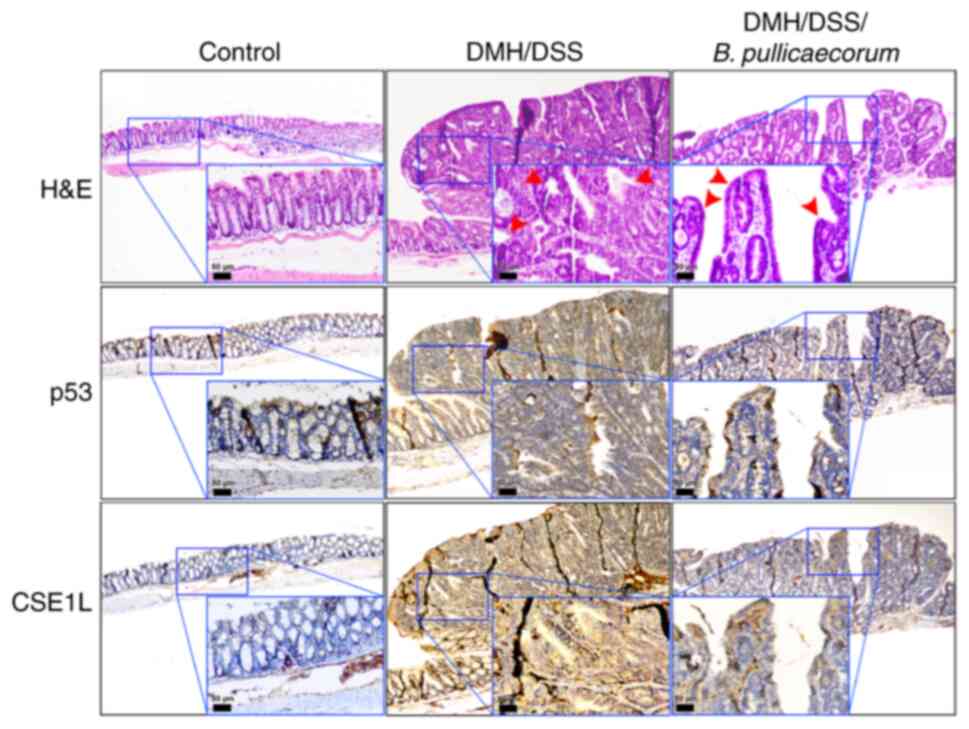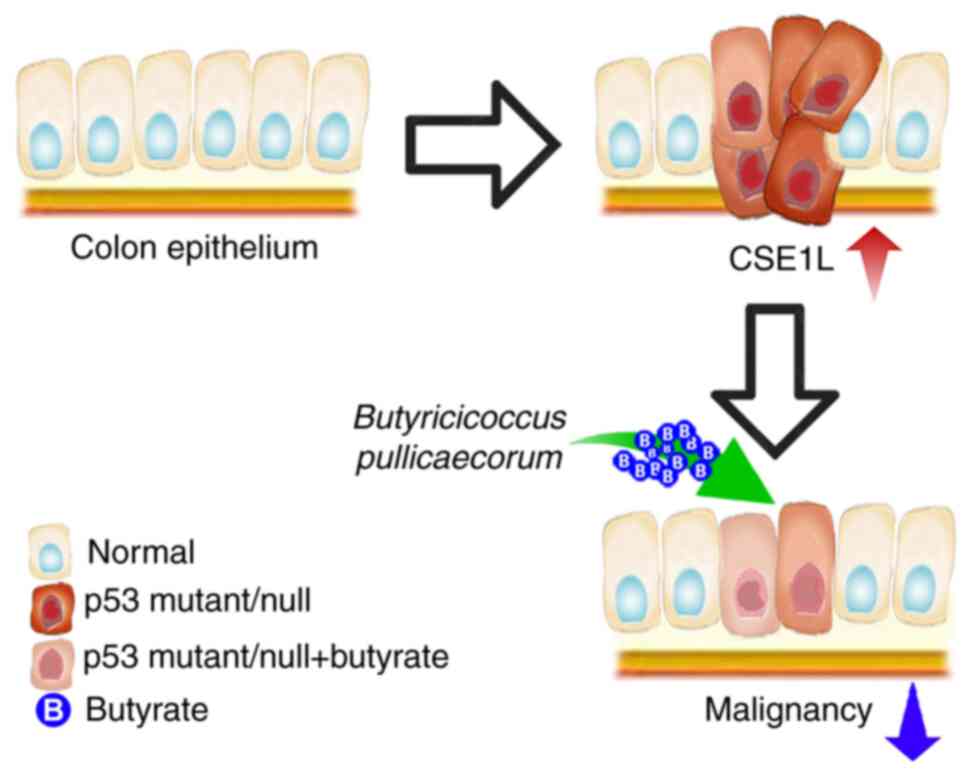|
1
|
Jiang K, Neill K, Cowden D, Klapman J,
Eschrich S, Pimiento J, Malafa MP and Coppola D: Expression of
CAS/CSE1L, the cellular apoptosis susceptibility protein,
correlates with neoplastic progression in barrett's esophagus. Appl
Immunohistochem Mol Morphol. 26:552–556. 2018. View Article : Google Scholar
|
|
2
|
Li Y, Yuan S, Liu J, Wang Y, Zhang Y, Chen
X and Si W: CSE1L silence inhibits the growth and metastasis in
gastric cancer by repressing GPNMB via positively regulating
transcription factor MITF. J Cell Physiol. 235:2071–2079. 2020.
View Article : Google Scholar
|
|
3
|
Liao CF, Lin SH, Chen HC, Tai CJ, Chang
CC, Li LT, Yeh CM, Yeh KT, Chen YC, Hsu TH, et al: CSE1L, a novel
microvesicle membrane protein, mediates Rastriggered microvesicle
generation and metastasis of tumor cells. Mol Med. 18:1269–1280.
2012. View Article : Google Scholar
|
|
4
|
Tai CJ, Su TC, Jiang MC, Chen HC, Shen SC,
Lee WR, Liao CF, Chen YC, Lin SH, Li LT, et al: Correlations
between cytoplasmic CSE1L in neoplastic colorectal glands and depth
of tumor penetration and cancer stage. J Transl Med. 11:292013.
View Article : Google Scholar
|
|
5
|
Tunccan T, Duzer S, Dilek G, Yuksel UM,
Cetiner H, Kılıc C, Ant A and Duran AB: The role of CSE1L
expression in cervical lymph node metastasis of larynx tumors. Braz
J Otorhinolaryngol. 87:42–46. 2021. View Article : Google Scholar
|
|
6
|
Tanaka T, Ohkubo S, Tatsuno I and Prives
C: hCAS/CSE1L associates with chromatin and regulates expression of
select p53 target genes. Cell. 130:638–650. 2007. View Article : Google Scholar
|
|
7
|
Liao CF, Luo SF, Shen TY, Lin CH, Chien
JT, Du SY and Jiang MC: CSE1L/CAS, a microtubule-associated
protein, inhibits taxol (paclitaxel)-induced apoptosis but enhances
cancer cell apoptosis induced by various chemotherapeutic drugs.
BMB Rep. 41:210–216. 2008. View Article : Google Scholar
|
|
8
|
Pimiento JM, Neill KG, Henderson-Jackson
E, Eschrich SA, Chen DT, Husain K, Shibata D, Coppola D and Malafa
M: Knockdown of CSE1L gene in colorectal cancer reduces
tumorigenesis in vitro. Am J Pathol. 186:2761–2768. 2016.
View Article : Google Scholar
|
|
9
|
Tai CJ, Hsu CH, Shen SC, Lee WR and Jiang
MC: Cellular apoptosis susceptibility (CSE1L/CAS) protein in cancer
metastasis and chemotherapeutic drug-induced apoptosis. J Exp Clin
Cancer Res. 29:1102010. View Article : Google Scholar
|
|
10
|
Huang CC, Shen MH, Chen SK, Yang SH, Liu
CY, Guo JW, Chang KW and Huang CH: Gut butyrate-producing organisms
correlate to placenta specific 8 protein: Importance to colorectal
cancer progression. J Adv Res. 22:7–20. 2020. View Article : Google Scholar
|
|
11
|
Wang Y, Huang D, Chen KY, Cui M, Wang W,
Huang X, Awadellah A, Li Q, Friedman A, Xin WW, et al: Fucosylation
deficiency in mice leads to colitis and adenocarcinoma.
Gastroenterology. 152:193–205. 2017. View Article : Google Scholar
|
|
12
|
Venegas DP, De la Fuente MK, Landskron G,
González MJ, Quera R, Dijkstra G, Harmsen HJM, Faber KN and Hermoso
MA: Short chain fatty acids (scfas)-mediated gut epithelial and
immune regulation and its relevance for inflammatory bowel
diseases. Front Immunol. 10:2772019. View Article : Google Scholar
|
|
13
|
Puertollano E, Kolida S and Yaqoob P:
Biological significance of short-chain fatty acid metabolism by the
intestinal microbiome. Curr Opin Clin Nutr Metab Care. 17:139–144.
2014. View Article : Google Scholar
|
|
14
|
Gill PA, van Zelm MC, Muir JG and Gibson
PR: Review article: Short chain fatty acids as potential
therapeutic agents in human gastrointestinal and inflammatory
disorders. Aliment Pharmacol Ther. 48:15–34. 2018. View Article : Google Scholar
|
|
15
|
Kannen V, Parry L and Martin FL: Phages
enter the fight against colorectal cancer. Trends Cancer.
5:577–579. 2019. View Article : Google Scholar
|
|
16
|
Boesmans L, Valles-Colomer M, Wang J,
Eeckhaut V, Falony G, Ducatelle R, Van Immerseel F, Raes J and
Verbeke K: Butyrate producers as potential next-generation
probiotics: Safety assessment of the administration of
butyricicoccus pullicaecorum to healthy volunteers. mSystems.
3:e00094–e00018. 2018. View Article : Google Scholar
|
|
17
|
Chang SC, Shen MH, Liu CY, Pu CM, Hu JM
and Huang CJ: A gut butyrate-producing bacterium Butyricicoccus
pullicaecorum regulates short-chain fatty acid transporter and
receptor to reduce the progression of
1,2-dimethylhydrazine-associated colorectal cancer. Oncol Lett.
20:3272020. View Article : Google Scholar
|
|
18
|
Eeckhaut V, Wang J, Van Parys A,
Haesebrouck F, Joossens M, Falony G, Raes J, Ducatelle R and Van
Immerseel F: The probiotic butyricicoccus pullicaecorum reduces
feed conversion and protects from potentially harmful intestinal
microorganisms and necrotic enteritis in broilers. Front Microbiol.
7:14162016. View Article : Google Scholar
|
|
19
|
Wu X, Wu Y, He L, Wu L, Wang X and Liu Z:
Effects of the intestinal microbial metabolite butyrate on the
development of colorectal cancer. J Cancer. 9:2510–2517. 2018.
View Article : Google Scholar
|
|
20
|
Wang YC, Ku WC, Liu CY, Cheng YC, Chien
CC, Chang KW and Huang CJ: Supplementation of probiotic
butyricicoccus pullicaecorum mediates anticancer effect on bladder
urothelial cells by regulating butyrate-responsive molecular
signatures. Diagnostics (Basel). 11:22702021. View Article : Google Scholar
|
|
21
|
Kazemi Sefat NA, Mohammadi MM, Hadjati J,
Talebi S, Ajami M and Daneshvar H: Sodium butyrate as a histone
deacetylase inhibitor affects toll-like receptor 4 expression in
colorectal cancer cell lines. Immunol Invest. 48:759–769. 2019.
View Article : Google Scholar
|
|
22
|
Ji X, Zhou F, Zhang Y, Deng R, Xu W, Bai
M, Liu Y, Shao L, Wang X and Zhou L: Butyrate stimulates hepatic
gluconeogenesis in mouse primary hepatocytes. Exp Ther Med.
17:1677–1687. 2019.
|
|
23
|
Encarnacao JC, Pires AS, Amaral RA,
Gonçalves TJ, Laranjo M, Casalta-Lopes JE, Gonçalves AC,
Sarmento-Ribeiro AB, Abrantes AM and Botelho MF: Butyrate, a
dietary fiber derivative that improves irinotecan effect in colon
cancer cells. J Nutr Biochem. 56:183–192. 2018. View Article : Google Scholar
|
|
24
|
Nakano K, Mizuno T, Sowa Y, Orita T,
Yoshino T, Okuyama Y, Fujita T, Fujita NO, Matsukawa Y, Tokino T,
et al: Butyrate activates the WAF1/Cip1 gene promoter through Sp1
sites in a p53-negative human colon cancer cell line. J Biol Chem.
272:22199–22206. 1997. View Article : Google Scholar
|
|
25
|
Russo I, Luciani A, De Cicco P, Troncone E
and Ciacci C: Butyrate attenuates lipopolysaccharide-induced
inflammation in intestinal cells and crohn's mucosa through
modulation of antioxidant defense machinery. PLoS One.
7:e328412012. View Article : Google Scholar
|
|
26
|
Eeckhaut V, Machiels K, Perrier C, Romero
C, Maes S, Flahou B, Steppe M, Haesebrouck F, Sas B, Ducatelle R,
et al: Butyricicoccus pullicaecorum in inflammatory bowel disease.
Gut. 62:1745–1752. 2013. View Article : Google Scholar
|
|
27
|
Marteau P: Butyrate-producing bacteria as
pharmabiotics for inflammatory bowel disease. Gut. 62:16732013.
View Article : Google Scholar
|
|
28
|
Eeckhaut V, Ducatelle R, Sas B, Vermeire S
and Van Immerseel F: Progress towards butyrate-producing
pharmabiotics: Butyricicoccus pullicaecorum capsule and efficacy in
TNBS models in comparison with therapeutics. Gut. 63:3672014.
View Article : Google Scholar
|
|
29
|
Kilkenny C, Browne W, Cuthill IC, Emerson
M and Altman DG; NC3Rs Reporting Guidelines Working Group: Animal
research: Reporting in vivo experiments: The ARRIVE guidelines. J
Gene Med. 12:561–563. 2010. View Article : Google Scholar
|
|
30
|
Soucek K, Gajduskova P, Brazdova M,
Hýzd'alová M, Kocí L, Vydra D, Trojanec R, Pernicová Z, Lentvorská
L, Hajdúch M, et al: Fetal colon cell line FHC exhibits tumorigenic
phenotype, complex karyotype, and TP53 gene mutation. Cancer Genet
Cytogenet. 197:107–116. 2010. View Article : Google Scholar
|
|
31
|
Hayashi Y, Tsujii M, Kodama T, Akasaka T,
Kondo J, Hikita H, Inoue T, Tsujii Y, Maekawa A, Yoshii S, et al:
p53 functional deficiency in human colon cancer cells promotes
fibroblast-mediated angiogenesis and tumor growth. Carcinogenesis.
37:972–984. 2016. View Article : Google Scholar
|
|
32
|
Rochette PJ, Bastien N, Lavoie J, Guerin
SL and Drouin R: SW480, a p53 double-mutant cell line retains
proficiency for some p53 functions. J Mol Biol. 352:44–57. 2005.
View Article : Google Scholar
|
|
33
|
Huang CJ, Yang SH, Huang SM, Lin CM, Chien
CC, Chen YC, Lee CL, Wu HH and Chang CC: A predicted protein,
KIAA0247, is a cell cycle modulator in colorectal cancer cells
under 5-FU treatment. J Transl Med. 9:822011. View Article : Google Scholar
|
|
34
|
Ishimine M, Lee HC, Nakaoka H, Orita H,
Kobayashi T, Mizuguchi K, Endo M, Inoue I, Sato K and Yokomizo T:
The Relationship between TP53 Gene status and carboxylesterase 2
expression in human colorectal cancer. Dis Markers.
2018:52807362018. View Article : Google Scholar
|
|
35
|
Abu El Maaty MA, Strassburger W, Qaiser T,
Dabiri Y and Wölfl S: Differences in p53 status significantly
influence the cellular response and cell survival to
1,25-dihydroxyvitamin D3-metformin cotreatment in colorectal cancer
cells. Mol Carcinog. 56:2486–2498. 2017. View Article : Google Scholar
|
|
36
|
Li DD, Sun T, Wu XQ, Chen SP, Deng R,
Jiang S, Feng GK, Pan JX, Zhang XC, Zeng YX and Zhu XF: The
inhibition of autophagy sensitises colon cancer cells with
wild-type p53 but not mutant p53 to topotecan treatment. PLoS One.
7:e450582012. View Article : Google Scholar
|
|
37
|
Bhat UG and Gartel AL: Differential
sensitivity of human colon cancer cell lines to the nucleoside
analogs ARC and DRB. Int J Cancer. 122:1426–1429. 2008. View Article : Google Scholar
|
|
38
|
Kralj M, Husnjak K, Körbler T and Pavelić
J: Endogenous p21WAF1/CIP1 status predicts the response of human
tumor cells to wild-type p53 and p21WAF1/CIP1 overexpression.
Cancer Gene Ther. 10:457–467. 2003. View Article : Google Scholar
|
|
39
|
Huang CJ, Lee CL, Yang SH, Chien CC, Huang
CC, Yang RN and Chang CC: Upregulation of the growth
arrest-specific-2 in recurrent colorectal cancers, and its
susceptibility to chemo-therapy in a model cell system. Biochim
Biophys Acta. 1862:1345–1353. 2016. View Article : Google Scholar
|
|
40
|
Leoni BD, Natoli M, Nardella M, Bucci B,
Zucco F, D'Agnano L and Felsani A: Differentiation of Caco-2 cells
requires both transcriptional and post-translational
down-regulation of Myc. Differentiation. 83:116–127. 2012.
View Article : Google Scholar
|
|
41
|
Livak KJ and Schmittgen TD: Analysis of
relative gene expression data using real-time quantitative PCR and
the 2(-Delta Delta C(T)) method. Methods. 25:402–408. 2001.
View Article : Google Scholar
|
|
42
|
Jonkman JE, Cathcart JA, Xu F, Bartolini
ME, Amon JE, Stevens KM and Colarusso P: An introduction to the
wound healing assay using live-cell microscopy. Cell Adh Migr.
8:440–451. 2014. View Article : Google Scholar
|
|
43
|
Ye S, Zhou HB, Chen Y, Li KQ, Jiang SS and
Hao K: Crizotinib changes the metabolic pattern and inhibits ATP
production in A549 non-small cell lung cancer cells. Oncol Lett.
21:612021. View Article : Google Scholar
|
|
44
|
Winkler J, Roessler S, Sticht C, DiGuilio
AL, Drucker E, Holzer K, Eiteneuer E, Herpel E, Breuhahn K, Gretz
N, et al: Cellular apoptosis susceptibility (CAS) is linked to
integrin beta1 and required for tumor cell migration and invasion
in hepatocellular carcinoma (HCC). Oncotarget. 7:22883–22892. 2016.
View Article : Google Scholar
|
|
45
|
Zhu JH, Hong DF, Song YM, Sun LF, Wang ZF
and Wang JW: Suppression of cellular apoptosis susceptibility
(CSE1L) inhibits proliferation and induces apoptosis in colorectal
cancer cells. Asian Pac J Cancer Prev. 14:1017–1021. 2013.
View Article : Google Scholar
|
|
46
|
Nagashima S, Maruyama J, Honda K, Kondoh
Y, Osada H, Nawa M, Nakahama KI, Yuasa MI, Kagechika H, Sugimura H,
et al: CSE1L promotes nuclear accumulation of transcriptional
coactivator TAZ and enhances invasiveness of human cancer cells. J
Biol Chem. 297:1008032021. View Article : Google Scholar
|
|
47
|
Snijders AM and Mao JH: Multi-omics
approach to infer cancer therapeutic targets on chromosome 20q
across tumor types. Adv Mod Oncol Res. 2:215–223. 2016. View Article : Google Scholar
|
|
48
|
Behrens P, Brinkmann U and Wellmann A:
CSE1L/CAS: Its role in proliferation and apoptosis. Apoptosis.
8:39–44. 2003. View Article : Google Scholar
|
|
49
|
Li H, Zhang J, Tong JHM, Chan AWH, Yu J,
Kang W and To KF: Targeting the oncogenic p53 mutants in colorectal
cancer and other solid tumors. Int J Mol Sci. 20:59992019.
View Article : Google Scholar
|
|
50
|
Iacopetta B: TP53 mutation in colorectal
cancer. Hum Mutat. 21:271–276. 2003. View Article : Google Scholar
|
|
51
|
Wang X, Ren Y, Ma S and Wang S: Circular
RNA 0060745, a novel circRNA, promotes colorectal cancer cell
proliferation and metastasis through miR-4736 sponging. Onco
Targets Ther. 13:1941–1951. 2020. View Article : Google Scholar
|
|
52
|
Ma S, Yang D, Liu Y, Wang Y, Lin T, Li Y,
Yang S, Zhang W and Zhang R: LncRNA BANCR promotes tumorigenesis
and enhances adriamycin resistance in colorectal cancer. Aging
(Albany NY). 10:2062–2078. 2018. View Article : Google Scholar
|
|
53
|
Cheng DD, Lin HC, Li SJ, Yao M, Yang QC
and Fan CY: CSE1L interaction with MSH6 promotes osteosarcoma
progression and predicts poor patient survival. Sci Rep.
7:462382017. View Article : Google Scholar
|
|
54
|
Ye M, Han R, Shi J, Wang X, Zhao AZ, Li F
and Chen H: Cellular apoptosis susceptibility protein (CAS)
suppresses the proliferation of breast cancer cells by upregulated
cyp24a1. Med Oncol. 37:432020. View Article : Google Scholar
|
|
55
|
Li KK, Yang L, Pang JC, Chan AKY, Zhou L,
Mao Y, Wang Y, Lau KM, Poon WS, Shi Z and Ng HK: MIR-137 suppresses
growth and invasion, is downregulated in oligodendroglial tumors
and targets CSE1L. Brain Pathol. 23:426–439. 2013. View Article : Google Scholar
|
|
56
|
Beaumont M, Paes C, Mussard E, Knudsen C,
Cauquil L, Aymard P, Barilly C, Gabinaud B, Zemb O, Fourre S, et
al: Gut microbiota derived metabolites contribute to intestinal
barrier maturation at the suckling-to-weaning transition. Gut
Microbes. 11:1–19. 2020. View Article : Google Scholar
|
|
57
|
Silva JPB, Navegantes-Lima KC, Oliveira
ALB, Rodrigues DVS, Gaspar SLF, Monteiro VVS, Moura DP and Monteiro
MC: Protective mechanisms of butyrate on inflammatory bowel
disease. Curr Pharm Des. 24:4154–4166. 2018. View Article : Google Scholar
|
|
58
|
Zhao Y, Shi L, Hu C and Sang S: Wheat bran
for colon cancer prevention: The synergy between phytochemical
alkylresorcinol C21 and intestinal microbial metabolite butyrate. J
Agric Food Chem. 67:12761–12769. 2019. View Article : Google Scholar
|
|
59
|
Pant K, Mishra AK, Pradhan SM, Nayak B,
Das P, Shalimar D, Saraya A and Venugopal SK: Butyrate inhibits HBV
replication and HBV-induced hepatoma cell proliferation via
modulating SIRT-1/Ac-p53 regulatory axis. Mol Carcinog. 58:524–532.
2019. View Article : Google Scholar
|















